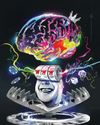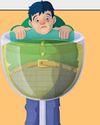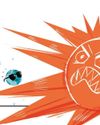
No one has ever seen a Higgs boson. In fact, of all the particles in the Standard Model of Particle Physics arguably only the photon (a particle of light) is, in any sense, visible. All the others - quarks, electrons, mu and tau leptons, neutrinos, gluons, and W and Z bosons are effectively invisible.
As for the Higgs boson, even indirectly inferring its existence took a 40-year search with the most complex machine ever built. Its discovery in 2012 at the Large Hadron Collider (LHC) was considered one of the most important advances of modern physics and a huge success of the Standard Model.
Using a combination of data from ATLAS and CMS, the LHC's two biggest detectors, the Higgs detection confirmed our picture of how fundamental particles (such as quarks and electrons) acquired the properties we measure today, and how the forces of nature arranged themselves in the early Universe.
Now that we have the Higgs, researchers at the LHC have been hoping to use it to better understand the Standard Model itself or, ideally, find a hint of 'new physics' that would indicate what kind of theory might replace it. But how do we study a particle we can't see? What are we really looking at? The answers are complicated, but they touch on something much deeper: the entanglement of theoretical models and experimental data.
DR KATIE MACK
Diese Geschichte stammt aus der August 2023-Ausgabe von BBC Science Focus.
Starten Sie Ihre 7-tägige kostenlose Testversion von Magzter GOLD, um auf Tausende kuratierte Premium-Storys sowie über 8.000 Zeitschriften und Zeitungen zuzugreifen.
Bereits Abonnent ? Anmelden
Diese Geschichte stammt aus der August 2023-Ausgabe von BBC Science Focus.
Starten Sie Ihre 7-tägige kostenlose Testversion von Magzter GOLD, um auf Tausende kuratierte Premium-Storys sowie über 8.000 Zeitschriften und Zeitungen zuzugreifen.
Bereits Abonnent? Anmelden

NOW YOU SEE ME, NOW YOU DON'T
Scientists around the world are working on ways to hide us from sight. But how close are we to developing tech that could make us invisible?

UNCORKED POTENTIAL
How much good can ditching drink for a month really do? Answer: a whole lot. In fact, science shows even short-term abstinence could unlock a cocktail of lasting benefits

Scientists discover when humans and dogs became friends
The relationship spans thousands of years, but experts might have pinpointed the first connection

Why it's so hard to kick a gambling addiction
We now know that gambling can be as addictive as drugs, but there are factors that can make it even harder to quit

How much could Ozempic change our world?
The weight-loss drug has made headlines and broken sales records, but what does it mean for our future?

WHY DOES DRINKING ALCOHOL MAKE IT SO MUCH HARDER TO LOSE WEIGHT?
While enjoying the occasional glass of wine or pint of beer may seem harmless, regular or excessive alcohol consumption can significantly hinder your weight-loss journey for a few reasons:

Why do so many New Year's resolutions fail?
Establishing positive new habits is hard at any time of year. But there are ways to stop your attempts ending in failure

'Extreme' solar radiation storm could hit Earth
Sun-like stars may have tantrums far more frequently than we thought

HOW CAN I BANISH THE JANUARY BLUES?
Dark mornings, long chilly evenings and short days; many people find January tough.

Neutrinos are getting in the way of dark matter detection
These troublesome particles are difficult to detect, but they're starting to show up in places where they're not wanted